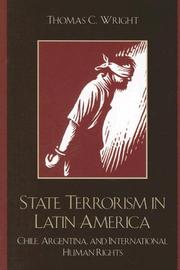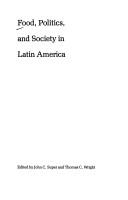| Listing 1 - 6 of 6 |
Sort by
|
Book
ISBN: 0292759274 Year: 2014 Publisher: Austin : University of Texas Press,
Abstract | Keywords | Export | Availability | Bookmark
 Loading...
Loading...Choose an application
- Reference Manager
- EndNote
- RefWorks (Direct export to RefWorks)
Universal human rights standards were adopted in 1948, but in the 1970s and 1980s, violent dictatorships in Argentina and Chile flagrantly defied the new protocols. Chilean general Augusto Pinochet and the Argentine military employed state terrorism in their quest to eradicate Marxism and other forms of “subversion.” Pinochet constructed an iron shield of impunity for himself and the military in Chile, while in Argentina, military pressure resulted in laws preventing prosecution for past human rights violations. When democracy was reestablished in both countries by 1990, justice for crimes against humanity seemed beyond reach. Thomas C. Wright examines how persistent advocacy by domestic and international human rights groups, evolving legal environments, unanticipated events that impacted public opinion, and eventual changes in military leadership led to a situation unique in the world—the stripping of impunity not only from a select number of commanders of the repression but from all those involved in state terrorism in Chile and Argentina. This has resulted in trials conducted by national courts, without United Nations or executive branch direction, in which hundreds of former repressors have been convicted and many more are indicted or undergoing trial. Impunity, Human Rights, and Democracy draws on extensive research, including interviews, to trace the erosion and collapse of the former repressors’ impunity—a triumph for human rights advocates that has begun to inspire authorities in other Latin American countries, including Peru, Uruguay, Brazil, and Guatemala, to investigate past human rights violations and prosecute their perpetrators.
Impunity --- Human rights --- Democracy

ISBN: 9780742537217 Year: 2007 Publisher: Lanham Rowman & Littlefield
Abstract | Keywords | Export | Availability | Bookmark
 Loading...
Loading...Choose an application
- Reference Manager
- EndNote
- RefWorks (Direct export to RefWorks)
Book
ISBN: 9781442235717 Year: 2017 Publisher: Lanham Rowman & Littlefield
Abstract | Keywords | Export | Availability | Bookmark
 Loading...
Loading...Choose an application
- Reference Manager
- EndNote
- RefWorks (Direct export to RefWorks)
This innovative text offers a clear and concise introduction to Latin America since independence. Thomas C. Wright traces continuity and change in five central colonial legacies: authoritarian governance; a rigid social hierarchy based on race, color, and gender; the powerful Roman Catholic Church; economic dependency; and the large landed estate. He shows that the outcomes of debate and contestation over these colonial legacies have been crucial in shaping contemporary political systems, economies, societies, and religious institutions in a richly diverse region. These unifying themes guide the reader through each period. The text's user-friendly illustrations, maps, chapter summaries, and suggestions for further reading enrich student understanding of a major part of the world--Provided by publisher.
Latin America --- History

ISBN: 0275940993 Year: 1991 Publisher: Westport Praeger
Abstract | Keywords | Export | Availability | Bookmark
 Loading...
Loading...Choose an application
- Reference Manager
- EndNote
- RefWorks (Direct export to RefWorks)
Radicalism --- Violence --- History --- Cuba --- Latin America --- United States --- Influence. --- Politics and government --- Military policy.

ISBN: 0803241372 Year: 1985 Publisher: Lincoln University of Nebraska press
Abstract | Keywords | Export | Availability | Bookmark
 Loading...
Loading...Choose an application
- Reference Manager
- EndNote
- RefWorks (Direct export to RefWorks)
Food consumption --- Food supply --- Government policy --- Latin America --- Social conditions.

ISBN: 9780826319579 Year: 1998 Publisher: Albuquerque University of New Mexico Press
Abstract | Keywords | Export | Availability | Bookmark
 Loading...
Loading...Choose an application
- Reference Manager
- EndNote
- RefWorks (Direct export to RefWorks)
Chileans --- Social adjustment --- Political refugees --- Politics and government --- Chile
| Listing 1 - 6 of 6 |
Sort by
|

 Search
Search Feedback
Feedback About UniCat
About UniCat  Help
Help News
News